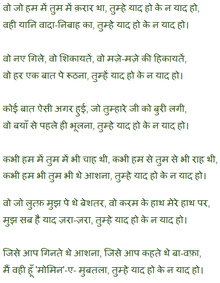Momin Khan Momin
Momin Khan Momin (1800–1851) (Urdu: مؤمن خان مؤمنؔ—Moʾmin Xān Moʾmin) was a Mughal era poet known for his Urdu ghazals and used "Momin" as his taxalluṣ (the Urdu word for nom de plume). He was a contemporary of Mirza Ghalib and Zauq, today his grave lies near the parking area near Maulana Azad Medical College, Delhi.[1]
Early life
Momin Khan Momin was born in Delhi into a Kashmiri [2][3] family of Mughal administrators and physicians. He was also called "Hakeem Khan" because he was himself a physician, Hakeem being the Urdu word for physician.
Other of his interests and where he was competent included mathematics, geomancy, astrology, chess or music.[4][5][6]
Career

Momin is known for his particular Persianized style and the beautiful use of his takhllus. According to legend, Mirza Ghalib (his contemporary and also a rival) offered Momin his entire diwan (collection of poetry) in exchange for a particular verse of Momin. However most modern poet believe this claim as sarcasm rather than respect.The couplet in question was:
- تم میرے پاس ہوتے ہو گویا
- جب کوئی دوسرا نہیں ہوتا
- "Tum mērē pās hōtē hō gōyā
- Jab kō'ī dūsrā nahīⁿˡ hotā"
which translates to:
- You are close to me [as if]
- When no one else is.
This couplet's beauty is in its succinctness and multiple layers of meaning. One of the meanings is When you're with me(on my mind), no-one else is and a second meaning/interpretation is You are with me (on my side), when no-one else is. The two meanings emerge by the use of words gōyā and jab (when)."
One of his very famous ghazals starts with the following matla (the first line of the opening couplet of a ghazal).
- Woh jō ham mēⁿ tum mēⁿ qarār tḣā; tumhēⁿ yād hō, keh nah yād hō:
- Wohī, yaʿnī waʿdah nibāh kā; tumhēⁿ yād hō, keh nah yād hō
- That understanding which we had between us... whether you remember it or not...
- That promise of trust and faithfulness...whether you remember it or not...
He is also famed in Pakistan for the saying:
عمر ساری تو کاٹی عشقِ بتا میں مومن آخری وقت میں کیا خاک مسلماں ہو گۓ
- ʿUmr sārī tō kāṫī ʿišq-e butāⁿ mēⁿ Moʾmin,
- Āxrī waqt mēⁿ kyā xāk Musalmāⁿ hōⁿ gē?
Translation:
- "You spent all your life in the love of Idols Momin
- How will you become a muslim, now that the end is near?"
The word "xāk" translates to "sand" or "dust". It refers to the sand that is used for burial of Muslim bodies. The poet here refers to the sand in which his body will become mixed to, after burial.
- All your life you spent in love for idols, O Momin [Believer]!
- At the last moment, how can you become a Muslim?
Example of Momin's work
Momin Khan Momin's poem: "Woh jō ham mēⁿ tum mēⁿ qarār tḣā..."; which is shown above, is one of the best known poems of Urdu literature.
Death
He also predicted his death by predicting that he would lose his limbs before his death and was mentioned in the verse 'dast-o-bazu'. He came out true as he fell off a ladder and died.
References
- ↑ "In the lanes of Zauq and Ghalib". Indian Express. 15 March 2009.
- ↑ Abida Samiuddin, Encyclopaedic Dictionary of Urdu Literature, Global Vision Publishing House (2007), p. 342
- ↑ Kuldip Salill, A Treasury Of Urdu Poetry, Rajpal & Sons (2009), p.72
- ↑ K.C. Kanda, Masterpieces of Urdu Ghazal from the 17th to the 20th Century, Sterling (1992), p. 182
- ↑ Ali Jawad Zaidi, A History of Urdu literature, Sahitya Akademi (1993), p. 181
- ↑ D.J. Matthews, Urdu Literature, South Asia Books (1985), p. 86
External links
- Works by or about Momin Khan Momin at Internet Archive
- Momin Khan Momin at Urdu Poetry Archive
- Momin Khan Momin at Kavita Kosh